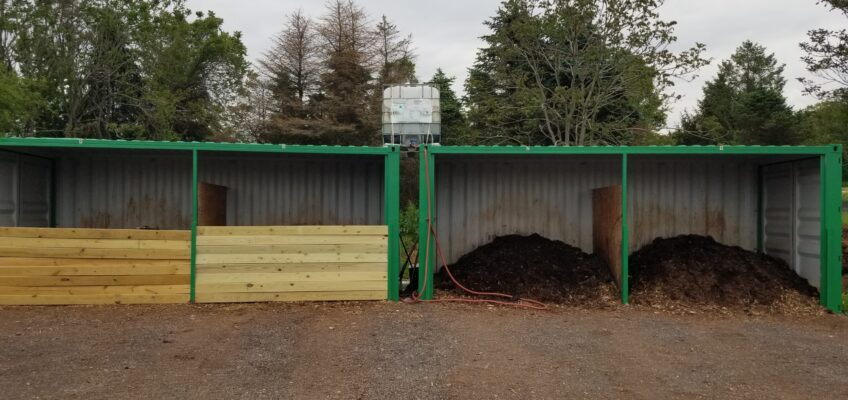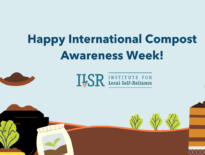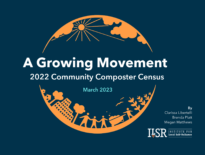Go to ILSR’s Composting Rules Library to see more detail on the law.
Maryland has been a national model for advancing on-farm composting since the state’s composting permit regulations were updated in 2015 with carve-outs for farms and small composting operations. Those rules – which ILSR championed – created a tiered permitting structure and exempted on-farm and small sites from needing a full composting facility permit for processing certain feedstock types in particular quantities, including off-site food scraps (COMAR 26.04.11.06). In its 2023 session, Maryland’s legislature created a new, expanded exemption by passing SB262/HB253, “On-Farm Composting Facilities—Permit Exemption.” This new law requires the Maryland Department of the Environment (MDE) to adopt regulations that more than double the area allowed for food scrap composting – from 5,000 sq. ft. for space used “in support of composting,” to 10,000 sq. ft. for “active composting.”
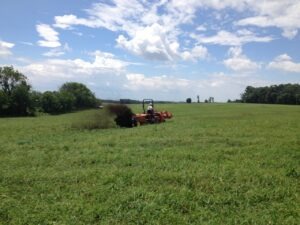
ILSR’s History of Advocacy
The new law represents a significant step forward in enlisting farmers to contribute to Maryland’s composting infrastructure, which has been identified as a key strategy for diverting food scraps from the solid waste stream at the both state and local levels, due in large part to ILSR’s efforts over many years. ILSR advocates for a diverse and distributed composting infrastructure that includes farms. We also document and promote model policies and programs that advance this vision via webinars, a policy library, and a policy map. We have been working to foster widespread support for on-farm composting and compost use nationally and most recently in Maryland as part of the Million Acre Challenge, a collaborative focused on proliferating the adoption of soil health practices on farms in the Chesapeake region.
Over the last two years, ILSR worked closely with key stakeholders and bill sponsors, playing an essential role in developing the bill language for SB262/HB253. During the 2022 legislative session (the first year it was introduced), ILSR led this process, coordinating input from the farming and environmental communities, bill sponsors, and University of Maryland Extension faculty. The bill language specifies restrictions for on-farm composting of food scraps to ensure sites are well-operated and high-quality compost is produced, while not overburdening farmers who are already subject to a number of overlapping regulatory requirements. In Maryland’s rules, food scraps and manures generated off-site are classified as a “Type 2” feedstock. The bill allows farmers to add clean “Off Site Type 2” feedstocks to materials generated on the farm. As defined in the bill, materials cannot contain more than 2 percent man-made inerts or plastic film, and they cannot include liquid feedstocks (such as grease or oil), animal mortalities from off-site, or industrial processing residuals. The bill requires best practices such as recordkeeping, immediate mixing of off-site food scraps with carbonaceous “Type 1” feedstock (e.g., yard trimmings), and incorporation into active composting within 24 hours after arriving on site.
Amendments were made to the bill during the 2023 session to establish the composting of off-site food scraps and manures at the 10,000 sq. ft. level as a new and distinct permit exemption category. They were made in collaboration with the Maryland Department of the Environment (MDE). This process was led by Clean Water Action and an active group of stakeholders that included ILSR, the MD Farm Bureau, a local farmer, and a local community composter, all of whom were also involved in 2022. Key changes include:
- Clarifying that requirements under the new exemption do not affect the existing 5,000 sq. ft. exemption, which covers off-site food scraps but does not require specific management practices be implemented.
- Clarifying that the new exemption would require the same agricultural reporting elements as the 40,000 sq. ft. (“Type 1” feedstocks) exemption. This includes a Nutrient Management Plan and either a Soil Conservation and Water Quality plan or an Agricultural Waste Management Plan.
- Reducing the area allowed under the new exemption from 40,000 sq. ft. (as introduced in 2022) to 10,000 sq. ft. ILSR was in favor of this reduction since there is no training or certification requirement.
- Narrowing the focus of the recordkeeping requirement only to off-site food scraps (not all off-site materials).
- Extending the period that records must be kept from 3 years to 5 years, and making it clear that MDE could request these records at any time from sites operating under the new permit exemption.
- Adding a section requiring MDE to present to the Maryland General Assembly by December 1, 2028, an assessment of the impact of on-farm composting facilities in the state. The report will include estimates for finished compost produced by on-farm sites, operational challenges faced by on-farm composters, violations and enforcement actions taken, and the feasibility of expanding the exemption to 40,000 sq. ft.
View ILSR’s submitted testimony here.

Looking Forward
The new law takes effect on October 1, 2023. For the full benefits of this new permit exemption to be realized, additional support in the form of technical assistance and demonstration sites aimed at farmers and farm service providers will be needed. To help meet this need, ILSR is partnering with the Office of Agriculture (OAG) in Montgomery County, Maryland, to build a farm-scale composting demonstration site that will be used to train farmers and Master Gardeners. We are supporting OAG’s vision for catalyzing on-farm composting in the county by adding to its equipment sharing program, engaging the county’s Master Gardener program, and setting the stage for a series of on-farm composting hubs. The composting hubs are inspired by local community composter, Compost Crew, which partners with farms to implement and manage modular Compost Outposts. Under the previous on-farm composting exemption, Compost Crew was processing roughly 4 tons monthly at each of their Outposts. Under the new exemption, that volume is likely to double.
Additionally, in order for all farmers around the state to be able to take advantage of this exemption, local zoning rules may need to be updated. While there are important lessons to be learned from cases where this process has been challenging, there are also successful examples of on-farm composting being embraced. We anticipate that continued outreach will be needed to proactively engage MDE and the farming community, which may be wary of taking advantage of this new exemption if it means potentially bringing the attention of MDE to their farms.
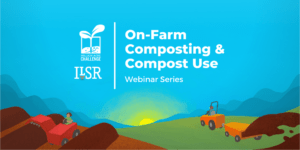
Benefits of On-Farm Composting
SB262/HB253 is a win-win for farmers and environmental activists. Composting is an age-old practice that is intrinsically tied to food production and consumption. Farmers who have intimate knowledge of their soils and want access to high-quality compost are ideal stewards of the composting process. Farms often have equipment that can be repurposed for composting, may be able to produce compost less expensively than purchasing it, and can tailor their composting recipes for their specific soil and crop needs. Composting recycles nutrients and organic matter from farm residuals, manures, and animal mortalities, but food scraps from off-site can be used to improve composting recipes. On-farm composting adds to local composting capacity and facilitates the use of compost in agricultural soil – which can reduce the amount of synthetic fertilizers a farm needs – and may provide additional sources of income to farms via tipping fees and compost sales.
The benefits of composting also extend to the broader environment, the climate, and society. Food alone makes up 21.6 percent of Maryland’s waste, while all compostable materials combined make up the single largest component of waste generated. Whereas materials thrown in the trash end up in polluting landfills or incinerators, composting food scraps and other organic materials avoids emissions associated with disposal, which is “a climate game changer.” Adding compost to soil provides essential organic matter and is another key short-term climate strategy as compost enhances soil’s ability to store carbon, especially in degraded soils. Indeed, the Maryland Healthy Soils Program is promoting and supporting the widespread use of healthy soils practices among farmers in Maryland, including the use of compost as a nutrient management strategy. Composting further creates local jobs and local production of compost contributes to more localized, resilient food systems.
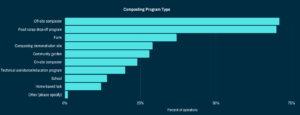
Benefits to Community Composting
SB262/HB253 may also serve as a model for supporting community composting. Of 86 total respondents of the 2022 Community Composter Census – representing 34 states, the District of Columbia, Canada, and Puerto Rico – 37 percent identify as farms. Regulatory allowances for small-sized composting, including permit exemptions, were identified as one of the top changes to local or state policies that would make sustaining or replicating community composting operations easier. Rules like Maryland’s create a permitting pathway for prospective composting facilities of all sizes.
Image: The Compost Crew Compost Outpost at ECO City Farms in Bladensburg, MD, courtesy of Compost Crew.



